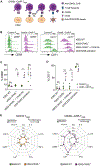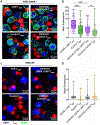Human OX40L-CAR-Tregs target activated antigen-presenting cells and control T cell alloreactivity
- PMID: 39413160
- PMCID: PMC11789419
- DOI: 10.1126/scitranslmed.adj9331
Human OX40L-CAR-Tregs target activated antigen-presenting cells and control T cell alloreactivity
Abstract
Regulatory T cells (Tregs) make major contributions to immune homeostasis. Because Treg dysfunction can lead to both allo- and autoimmunity, there is interest in correcting these disorders through Treg adoptive transfer. Two of the central challenges in clinically deploying Treg cellular therapies are ensuring phenotypic stability and maximizing potency. Here, we describe an approach to address both issues through the creation of OX40 ligand (OX40L)-specific chimeric antigen receptor (CAR)-Tregs under the control of a synthetic forkhead box P3 (FOXP3) promoter. The creation of these CAR-Tregs enabled selective Treg stimulation by engagement of OX40L, a key activation antigen in alloimmunity, including both graft-versus-host disease and solid organ transplant rejection, and autoimmunity, including rheumatoid arthritis, systemic sclerosis, and systemic lupus erythematosus. We demonstrated that OX40L-CAR-Tregs were robustly activated in the presence of OX40L-expressing cells, leading to up-regulation of Treg suppressive proteins without induction of proinflammatory cytokine production. Compared with control Tregs, OX40L-CAR-Tregs more potently suppressed alloreactive T cell proliferation in vitro and were directly inhibitory toward activated monocyte-derived dendritic cells (DCs). We identified trogocytosis as one of the central mechanisms by which these CAR-Tregs effectively decrease extracellular display of OX40L, resulting in decreased DC stimulatory capacity. OX40L-CAR-Tregs demonstrated an enhanced ability to control xenogeneic graft-versus-host disease compared with control Tregs without abolishing the graft-versus-leukemia effect. These results suggest that OX40L-CAR-Tregs may have wide applicability as a potent cellular therapy to control both allo- and autoimmune diseases.
Conflict of interest statement
B.R.B. has received remuneration as an adviser to Magenta Therapeutics and BlueRock Therapeutics; has received research funding from BlueRock Therapeutics, Rheos Medicines, and Carisma Therapeutics Inc.; and is a cofounder of Tmunity Therapeutics. L.S.K. is on the scientific advisory board of HiFiBIO; reports research funding from Magenta Therapeutics, Tessera Therapeutics, Novartis, Emmanuel Merck, Darmstadt Serono, Gilead Pharmaceuticals, and Regeneron Pharmaceuticals; reports consulting fees from Vertex; reports grants and personal fees from Bristol Myers Squibb; and reports a conflict of interest with Bristol Myers Squibb, which is managed under an agreement with the Harvard Medical School. V.T. reports consulting fees from 48 Bio Inc. X.R., U.G., V.T., and L.S.K. are inventors on a patent entitled “Regulatory T cells with chimeric antigen receptor targeting co-stimulatory molecules to prevent and/or treat inflammatory conditions” (patent no. WO2023164256A2). The remaining authors declare that they have no competing financial interests.
Figures







References
-
- Wardell CM, MacDonald KN, Levings MK, Cook L, Cross talk between human regulatory T cells and antigen-presenting cells: Lessons for clinical applications. Eur. J. Immunol 51, 27–38 (2021). - PubMed
Publication types
MeSH terms
Substances
Grants and funding
LinkOut - more resources
Full Text Sources

